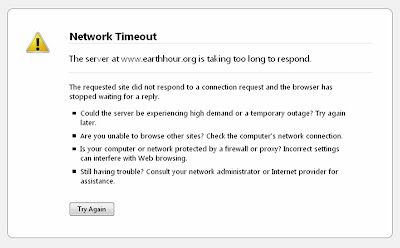 |
| 1 hour... 60 minutes... 3,600 seconds |
Ironically the website www.earthhour.org was blocked in China!!!China wouldnt' be China without all that quirkiness
It’s also tonight that the clocks are adjusted forward one hour in some parts of the world (to make it simple with time zones, the changes do not happen everywhere in the world at the same time or even happen at all… that would be too easy). So while Europe will “Spring forward” their time on the last Sunday of March and “fall back” their time on the last Sunday of October, the USA will do it on the second Sunday of March and the first Sunday in November. To read more anecdotes about daylight savings, click here.
Confused? Well let me tell you about what’s going on in some part of China. China doesn’t observe DST (they only did between 1986 and 1991) and has only one time zone (since May 1, 1980): almost 5,000 kms (3,000 miles) for West to East and one time: Beijing Time.In Xinjiang province, the Muslim Uighur minority makes a point of observing its own time, not that of local Han Chinese, who adhere to Beijing's imposition of a single time for all of China. […]
Kashgar, a city of 350,000 built around an oasis along the old Silk Road, has two time zones, two hours apart. How you set your watch depends not only on the neighborhood, but on your profession and ethnicity, religion and loyalty. People living on both sides of the time divide say there is little confusion because they have as little to do with each other as possible.
When communist China was formed in 1949, Mao Tse-tung decreed that everybody should follow a single time zone, no matter that the country is as wide as the continental United States.
But Uighurs, the dominant minority in China's northwestern Xinjiang province, balked at running their lives on Beijing time, which would have them getting up in the pitch dark and going to sleep at sunset. […]
So the Uighurs follow their own unofficial time, which is two hours earlier -- in effect following the dictates of the sun rather than of Beijing, about 2,000 miles away. […]
Schools, government offices, post offices all use Beijing time. So do the airports and railroad stations. Some bus lines use Xinjiang time and others Beijing time. […]
China is big enough to span five time zones but is the largest country in the world to insist on a single one. In contrast, Russia has 11.
"The reason goes back to a long Chinese imperial tradition in which the emperor is in control of time because it has a cosmological significance," said James Millward, a Xin- jiang scholar at Georgetown University. […]
Kashgar is almost due north of New Delhi and about the same latitude as New York. Its problems with timekeeping are worse in midwinter, when the sun doesn't rise according to a Beijing-oriented clock until past 10 a.m., and during the summer solstice, when sunset is close to 11 p.m.
Unofficially, the Chinese themselves have skewed their working hours, so most schools and many businesses don't actually open until 10 a.m. Beijing time. (Los Angeles Times)





